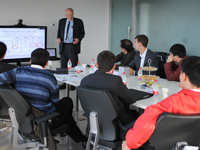Registration
You will receive an email confirming your registration.
IMGXYZ2831IMGZYXNuclear reprocessing continues to pose a number of economic and nonproliferation challenges. However, this process remains a significant factor in the current and future nuclear power plans of a number of nations. Frank von Hippel, a nuclear physicist and professor at Princeton University, visited the Carnegie-Tsinghua Center for Global Policy to participate in the third session of the Arms Control Seminar Series (ACSS). Von Hippel argued that once-through nuclear fuel cycle, in which fuel is used once and then sent to storage without further processing, remains the most economical and proliferation-resistant alternative to reprocessing. The event drew participants from Tsinghua University’s Institute of Nuclear and New Energy Technology, the China National Nuclear Corporation (CNNC), the Institute of Applied Physics and Computational Mathematics (IAPCM), the China Aerospace Science and Industry Corporation (CASIC), and others. The event was moderated by Carnegie’s Lora Saalman.
Benefits and History of Reprocessing
- Original Rationale: Civilian reprocessing originated as a method to obtain plutonium for initial cores of plutonium-breeder reactors in the 1970s. The original rationale for reprocessing was uranium scarcity. Von Hippel noted, however, that since then a plentiful supply of relatively cheap uranium has been discovered and geologists believe that much more remains to be unearthed. While the cost of uranium might fluctuate, it is unlikely that it will soon climb to the point where reprocessing and breeder reactors will be economically justified, he argued.
- History of Reprocessing: Before India’s 1974 nuclear test—which used separated plutonium from a research reactor provided under the Atoms for Peace program—the United States promoted plutonium breeder reactors worldwide. Following India’s test, successive U.S. administrations stopped supporting breeder reactors, claiming they were unnecessary and not economically viable. Over the years, a number of non-nuclear-weapon states also abandoned civilian reprocessing, including Belgium, Germany, and Italy.
- Global Nuclear Energy Partnership: In 2004, the Bush administration proposed a Global Nuclear Energy Partnership (GNEP) under which nuclear-weapons states and Japan would reprocess spent fuel for non-nuclear-weapons states. As part of this initiative, the Bush administration proposed building a very large reprocessing plant and sodium-cooled fast neutron reactors. However, von Hippel argued that this would have increased the cost of U.S. nuclear power and created many new waste streams. In any case, U.S. utilities were not willing to pay the extra costs and Congress refused to provide government backing, quashing the proposed program.
Costs of Reprocessing
- Not Economical: Von Hippel emphasized the capital costs of the fast-neutron reactors necessary for reprocessing are much higher than those of today’s light-water reactors. Moreover, reprocessing expenses greatly exceed that of dry-cask storage. About $100 billion has been spent thus far on failed efforts to commercialize fast-neutron plutonium breeder reactors in France, Germany, Japan, Russia, the United Kingdom, and the United States. While France, Russia, and the United Kingdom have attempted to sell reprocessing services internationally, only the Netherlands has renewed its contract with the French reprocessing industry.
- Breeder Reactors: The primary focus of Fast Breeder Reactor (FBR) development has been liquid metal fast breeder reactors (LMFBR) cooled by liquid sodium. Von Hippel explained that sodium-cooled reactors are, quoting nuclear pioneer Admiral Hyman Rickover, “expensive to build, complex to operate, susceptible to prolonged shutdown, and difficult and time-consuming to repair.” Countries with such reactors have encountered serious problems. France’s demonstration breeder reactor operated at an average of only 7 percent capacity and the UK’s at only 10 percent. Germany’s prototype breeder reactor was closed for design safety problems while Japan’s prototype reactor was shut down following a sodium fire and Russia’s reactor saw fourteen such fires in its first seventeen years.
- Proliferation Risks: Von Hippel argued there is no such thing as “proliferation-resistant reprocessing.” He reported that civilian reprocessing programs have generated a significant amount of weapons-directed separated plutonium. Reprocessing makes civilian plutonium accessible for nuclear devices, as India showed in 1974. Separated plutonium is also a greater theft risk, due to its relative ease of transportation compared to plutonium in a spent fuel assembly. This makes reprocessing not only a proliferation threat, but also a risk for potential terrorist acquisition.
- Radioactive Waste: Von Hippel added that reprocessing does not significantly reduce the problem of radioactive waste, and that storing its products is more dangerous than dry-cask storage, due to their susceptibility to overheating and targeting by terrorists.
Reprocessing in Asia
For most countries engaged in or contemplating reprocessing, the economic and proliferation costs far outweigh the benefits, von Hippel argued. He emphasized that China could play a vital role in setting an example for other countries by choosing to forgo reprocessing.
- Japan: Japan’s prime minister told President Carter in 1977 that Japan’s breeder reactor program was critical to its energy security. Yet, in 2010, Japan’s Rokkasho Reprocessing Plant is still not operating. Given Japan’s $20 billion investment in the Rokkasho plant, its reprocessing program has proven to be extraordinarily expensive with questionable benefits, argued von Hippel.
- South Korea: Despite the failures and costs encountered by other countries, South Korea has decided to pursue reprocessing and fast-neutron reactors. Von Hippel explained that the United States opposes South Korean reprocessing in part because it would make it more difficult to persuade North Korea to dismantle its plutonium program.
- China: China should perform its own assessment before engaging in a large-scale reprocessing program, von Hippel argued. He advocated studies on the future of uranium availability and estimates of the expense of reprocessing and breeder reactor commercialization, compared with spent-fuel storage. In his opinion, China would be best served by not commercializing reprocessing, at least until fast-neutron reactors are shown to be cost-competitive with light-water reactors operating on a once-through fuel cycle with spent-fuel storage. Finally, von Hippel emphasized there would be far-reaching implications for nuclear weapon proliferation if non-nuclear-weapon states in East Asia—such as Indonesia, South Korea, and Vietnam—followed China’s example and undertook reprocessing programs.
Discussants: Nate Adler, Jonathan Goldstein, Lynn von Koch-Liebert, Will Tucker, David Turnbull
